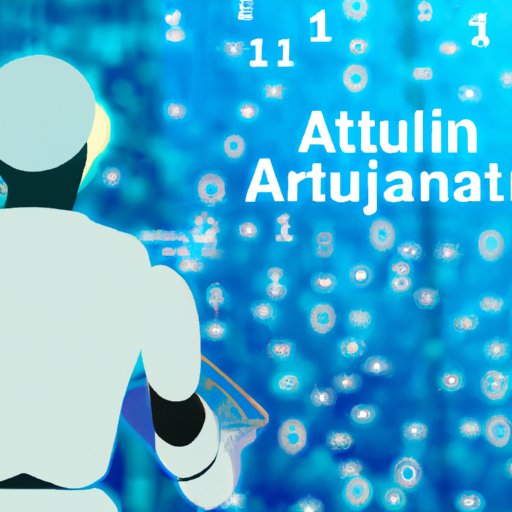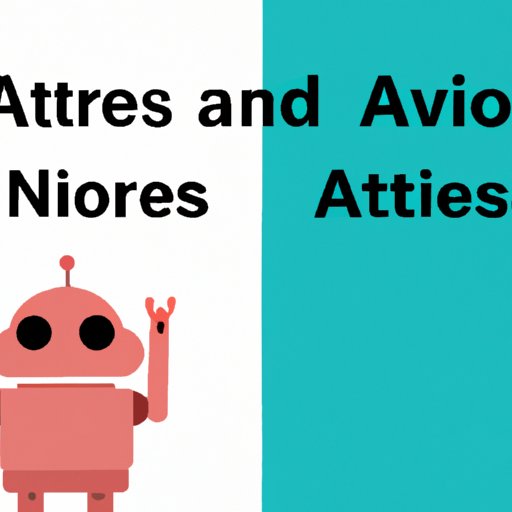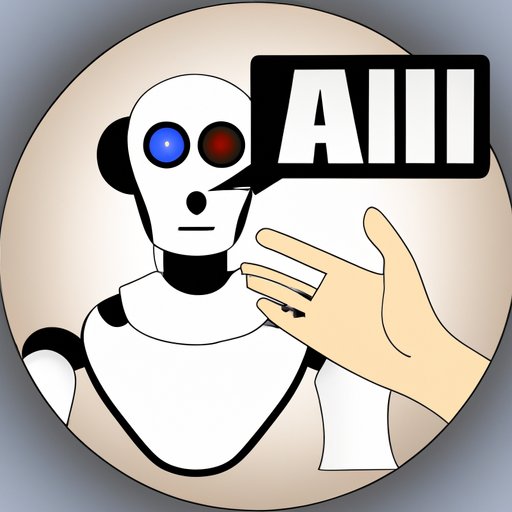Introduction
Artificial intelligence (AI) has been a hot topic for years. From sci-fi movies to tech news, AI has become an ever-present part of our lives. But what exactly is AI and why is this topic so important?
AI is a branch of computer science that focuses on creating machines that can think and act like humans. The goal of AI is to develop algorithms that can learn and make decisions without being explicitly programmed to do so. This technology has the potential to revolutionize our lives and drastically change the way we live.

Examining the Potential Impact of AI on Human Jobs
One of the biggest concerns about AI is its potential to take away human jobs. Automation is already a reality in many industries, and as AI continues to develop, more and more jobs will be replaced by machines. According to a study by McKinsey Global Institute, automation could replace up to 30 percent of the world’s current jobs by 2030.
“The impact of automation on jobs varies greatly across sectors and occupations, with lower-paying, lower-skilled, and less-educated workers at greatest risk,” said Susan Lund, a co-author of the report. “It’s important to remember that these job losses are not evenly distributed—some regions, sectors, ages, genders, and educational levels will be harder hit than others.”
In addition to automation, AI could also change the workplace in other ways. For example, AI-powered machines could be used to monitor employee performance and reduce the need for manual labor. AI could also help organizations automate tedious tasks, freeing up employees to focus on higher-value work.
Exploring the Latest Developments in AI Technology
AI-powered machines have become increasingly common in recent years. From self-driving cars to intelligent personal assistants, AI is making its way into our everyday lives. In addition, AI is also being used to analyze data and make predictions, helping companies make better decisions.
AI is also being used to create virtual assistants that can interact with customers and provide personalized recommendations. These assistants use natural language processing (NLP) and machine learning to understand user intent and provide relevant information. This technology is already being used by companies such as Amazon, Google, and Apple to enhance their customer service.
AI and Automation: Friend or Foe?
Automation has the potential to benefit both businesses and consumers. Automating mundane tasks can increase efficiency and reduce costs, allowing businesses to focus on more value-added activities. Automation can also improve customer experience by providing faster and more accurate service.
However, automation also has its drawbacks. Automated systems can be expensive to implement and maintain, and they often require specialized knowledge to operate. In addition, some experts worry that automation could lead to job losses and income inequality.

The Pros and Cons of AI Taking Over
There are both benefits and drawbacks to AI taking over. On the one hand, AI could lead to increased efficiency and productivity. AI-powered machines could automate mundane tasks, freeing up human workers to focus on more creative or complex work. AI could also help businesses make better decisions by analyzing large amounts of data quickly and accurately.
On the other hand, AI could lead to job losses and privacy concerns. AI-powered machines are not yet sophisticated enough to replace humans completely, but they could replace certain roles in the workplace. In addition, AI algorithms can be difficult to understand and may not always make the best decisions. Finally, AI could lead to increased surveillance and invasion of privacy.
Could AI Replace Human Decision-Making?
As AI technologies continue to develop, there is a growing concern that AI could replace human decision-making. This raises ethical questions about whether AI should be trusted to make decisions and if so, how should those decisions be made?
AI algorithms can be trained to make decisions based on data and past experiences. However, these algorithms can be biased and may not always make the best decisions. In addition, AI algorithms can be difficult to understand, making it difficult to predict their behavior.
Can AI be Trusted to Make Decisions?
The question of whether AI can be trusted to make decisions is a complex one. On the one hand, AI algorithms can be trained to make decisions quickly and accurately, without the bias that can come from human decision-makers. On the other hand, AI algorithms can be difficult to understand and may not always make the right decisions.
The ethics of AI decision-making is a hotly debated topic. Many experts believe that AI should be held to the same standards of accountability as human decision-makers. Others argue that AI should be given more leeway, since it is unable to fully understand the consequences of its actions.
Ultimately, it is up to society to decide whether AI can be trusted to make decisions. Are we ready to give up control and trust AI with such power?
What Would a World with AI Domination Look Like?
If AI takes over, it could drastically change the way we live. Companies could be powered by AI algorithms, allowing them to make decisions quickly and accurately. Governments could use AI to manage resources and make policy decisions. AI-powered robots could be used to automate mundane tasks, freeing up humans to focus on more creative endeavors.
The implications of AI domination are far-reaching and largely unknown. Some experts worry that AI could lead to increased surveillance and invasion of privacy. Others are concerned that AI could lead to job losses and inequality. It is important to consider these potential risks before embracing AI too quickly.
Conclusion
AI has the potential to revolutionize our lives and drastically change the way we live. It could lead to increased efficiency and productivity, but it could also lead to job losses and privacy concerns. As AI continues to develop, it is important to consider the potential risks and rewards of AI taking over.
AI could lead to increased automation and improved decision-making, but it could also lead to increased surveillance and invasion of privacy. It is up to society to decide whether AI can be trusted to make decisions and if so, how those decisions should be made. Ultimately, only time will tell what a world with AI domination would look like.
(Note: Is this article not meeting your expectations? Do you have knowledge or insights to share? Unlock new opportunities and expand your reach by joining our authors team. Click Registration to join us and share your expertise with our readers.)
